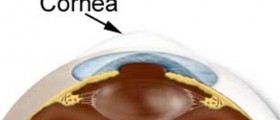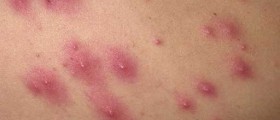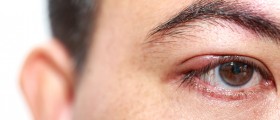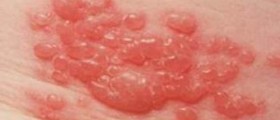
About herpes simplex
Herpes simplex is a virus that has two basic types Type 1 virus causes cold sores and eye infections while the Type 2 is responsible for genital herpes and rarely causes cold sores as well.
Many people get infected with herpes simplex type 1 virus, usually in the childhood. The virus easily penetrates the skin and mucosa, especially if there is a tiny opening, such as a cut. When the virus is first contracted, it may or may nor cause an outbreak with characteristic symptoms. After the first outbreak, the virus remains in the body in the dormant state. For some people it does not activate ever again but for many it activates whenever there is a drop in the immune response, for example during or after illnesses. Some people have recurrent outbreaks of reactivated herpes simplex several times a year.
Herpes simplex cannot be permanently expelled from the body but it can be managed, mainly through prevention of future outbreaks.
Herpes simplex eye infection
Herpes simplex type 1 virus can also cause infections of the eye, especially of the cornea. The term for infections of the cornea is keratitis and it can be viral, bacterial or fungal.
In most cases, the virus affects the superficial layer of the cornea and resolves within several days, without any particular treatment. In some cases the infection may cause scars or ulcers on the cornea.
Epithelial keratitis is the term used for superficial corneal infections, while stromal eratitis affects deeper layers. Stromal keratitis is more serious and more likely to cause scars.
Aside from the cornea, herpes simplex virus can also affect the conjunctiva, causing conjunctivitis, and eyelids, causing blepharitis. The virus rarely affects deeper structures of the eye, such as retina and iris.
The symptoms of herpes simplex eye infection include redness of the eye, pain, itching and irritation, blurry or clouded vision, watery eyes and sensitivity to light.
Treatment for herpes simplex eye infections
It is recommended to see a doctor in case herpes simplex eye infection occurs, because it is necessary to determine which part of the eye is affected. Epithelial keratitis, which affects the superficial layer of the cornea, is usually treated with antiviral medications such as aciclovir ointment and ganciclovir eye drops. These medications prevent the virus from multiplying and spreading further.
Stromal keratitis requires similar treatment as epithelial keratitis, with the addition of steroid eye drops that reduce the inflammation. Some doctors also prescribe oral antiviral medication.
If the virus has only affected the eyelids or the conjunctiva, no specific treatment is required and the infection can be kept at bay with home remedies and improved hygienic habits.

















Your thoughts on this
Loading...